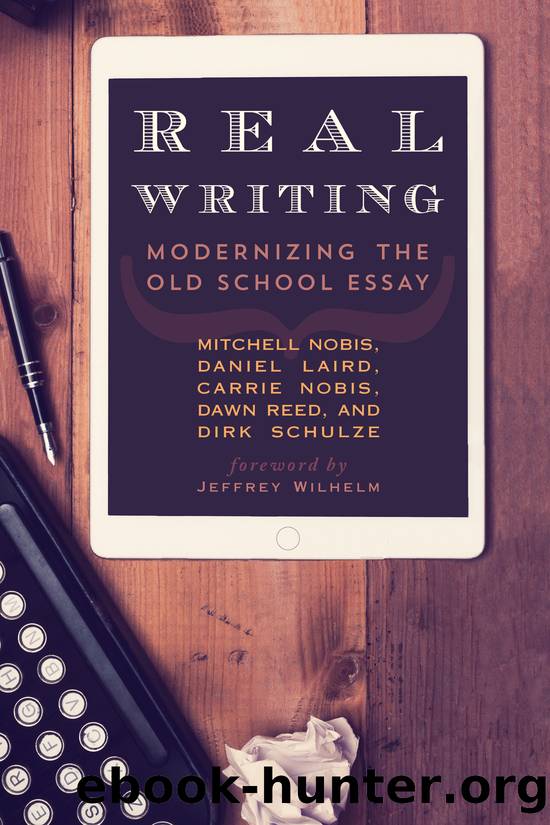Real Writing by Mitchell Nobis

Author:Mitchell Nobis
Language: eng
Format: epub
Publisher: Rowman & Littlefield Publishers
Published: 2020-12-23T00:00:00+00:00
Figure 3.2 Mingxuanâs script for her TED Talk
KQED Do Now
News sources engage conversation. KQED, a Northern California public media station, developed a pilot program in 2011 called Do Now, which was described as âa weekly activity for students to engage and respond to current issues using social media tools like Twitterâ and âaims to build civic engagement and digital literacy for young folksâ (KQED). The program grew with support from the National Writing Project, Educator Innovator, Twitter, and several other media and education organizations. Today, KQED produces Do Now activities twice a week on current events in the news, arts, and sciences and reaches thousands of educators across the country.
KQED Do Now, an opportunity any teacher can offer to students, begins with a question for students to consider, followed by brief background information, audio or visual media addressing the topic, and links to additional information. Students respond to the weekly topic on the blog or in Twitter posts with specific hashtags, as well as other social networking platforms. Additionally, students are invited to also create media responses to the question and to share a link to their original work. Through this work, students enter conversations related to relevant news topics with an authentic conversational purpose and an authentic audience of anyone online and, even more specifically, students across the nation engaging in this same work.
Students working with KQED Do Nowâs weekly civics, science, arts, and pop culture conversations engage with media and literacy as they use technologies for professional learning, so work with KQED Do Now offers an opportunity for students to build civic literacies with multimedia tools. These conversations support connected learning principles, offering authentic and engaging learning opportunities.
While civic discourse has its own merit, participation in KQED Do Now can support several other curricular objectives as well. Carrie and Mitch, for example, have both used KQED Do Now in essay writing classes. The Do Now posts and responses themselves are generally brief, but the rhetorical skills students take from the activity are highly transferrable; students learn to support a position with sound reasoning and to better anticipate counterarguments as they engage in real discourse about real issues with real people.
KQED and Literary Connections
Dawn has found that current events also relate to various texts of study in her classroom, supporting an integrated approach to using nonfiction in the classroom. For instance, when her class was studying To Kill a Mockingbird, a KQED Do Now civics question was âHow can we prevent Veterans from being homeless?â This prompted discussion related to poverty in the novel and the treatment of people living in poverty. When her class read Romeo and Juliet, a KQED Do Now civics question was âAre Schools Teaching Sex Ed Too Late?â During the exploration of this question, students related the content to the education needed to support healthy relationships, education that perhaps Romeo and Juliet would have benefited from.
In 2014 during the Winter Olympics in Sochi, Russia, students in Dawnâs American Literature course were studying revolutionary literature. The Olympic Games have had a political connection since they began and this year was no different.
Download
This site does not store any files on its server. We only index and link to content provided by other sites. Please contact the content providers to delete copyright contents if any and email us, we'll remove relevant links or contents immediately.
Cecilia; Or, Memoirs of an Heiress — Volume 1 by Fanny Burney(32519)
Cecilia; Or, Memoirs of an Heiress — Volume 2 by Fanny Burney(31925)
Cecilia; Or, Memoirs of an Heiress — Volume 3 by Fanny Burney(31912)
The Lost Art of Listening by Michael P. Nichols(7472)
Asking the Right Questions: A Guide to Critical Thinking by M. Neil Browne & Stuart M. Keeley(5731)
We Need to Talk by Celeste Headlee(5593)
On Writing A Memoir of the Craft by Stephen King(4907)
Dialogue by Robert McKee(4369)
Pre-Suasion: A Revolutionary Way to Influence and Persuade by Robert Cialdini(4193)
I Have Something to Say: Mastering the Art of Public Speaking in an Age of Disconnection by John Bowe(3863)
Elements of Style 2017 by Richard De A'Morelli(3330)
The Book of Human Emotions by Tiffany Watt Smith(3281)
Fluent Forever: How to Learn Any Language Fast and Never Forget It by Gabriel Wyner(3064)
Name Book, The: Over 10,000 Names--Their Meanings, Origins, and Spiritual Significance by Astoria Dorothy(2962)
Why I Write by George Orwell(2931)
Good Humor, Bad Taste: A Sociology of the Joke by Kuipers Giselinde(2929)
The Art Of Deception by Kevin Mitnick(2780)
The Grammaring Guide to English Grammar with Exercises by Péter Simon(2728)
Ancient Worlds by Michael Scott(2657)
